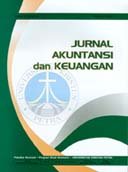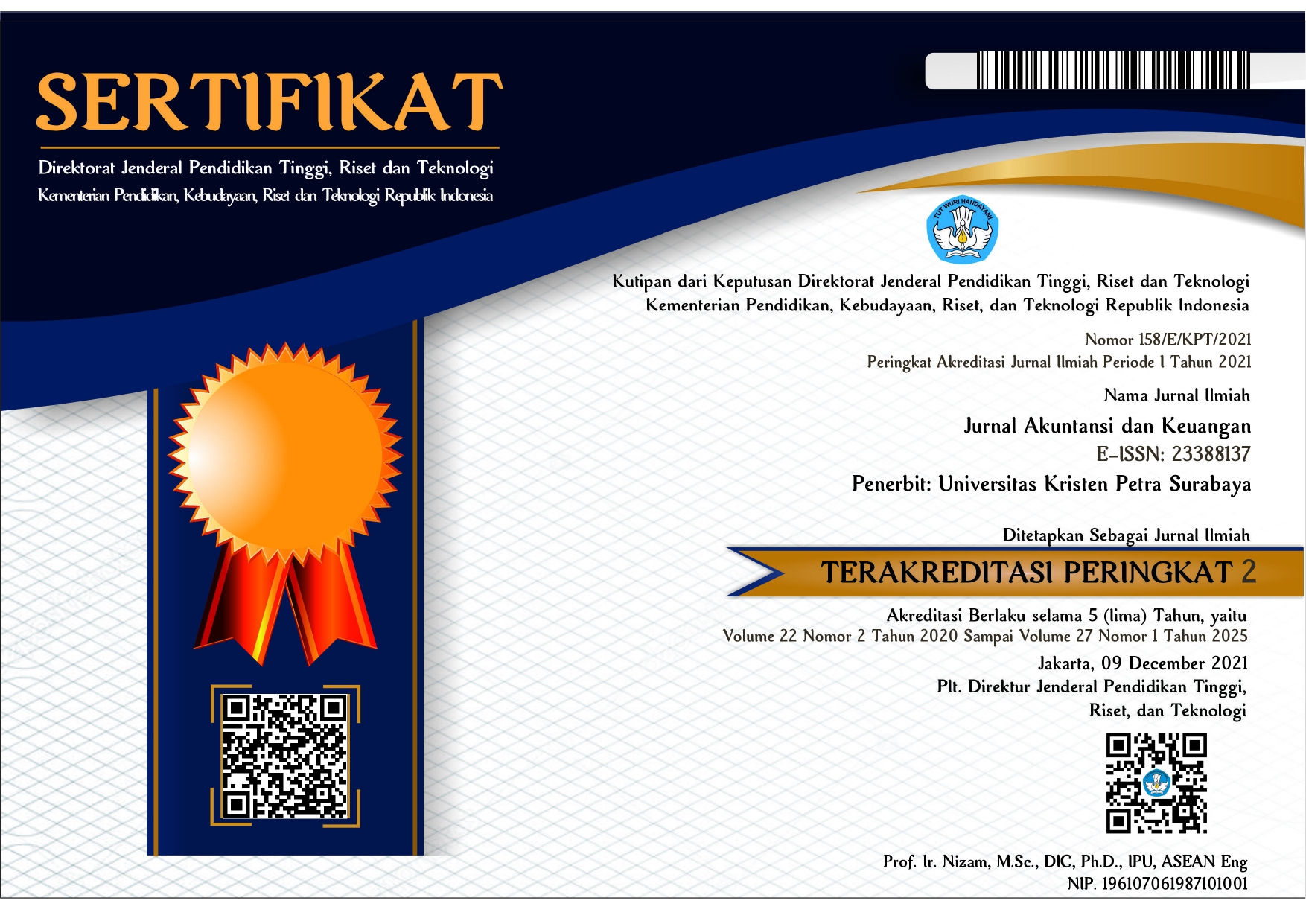The Influence of CEO’s Demographic Characteristics on Tax Aggressiveness in Family Firm
DOI:
https://doi.org/10.9744/jak.22.1.1-9Keywords:
Family firm, tax Aggressiveness, CEO Education Background, CEO Tenure, CEO Gender.Abstract
This research aims to analyze how the educational background, tenure, and gender of Chief Executive Officer (CEO) affect tax aggressiveness in a family firm. Independent variables comprise the educational background, tenure, and gender of CEO while tax aggressiveness plays as dependent variable. In addition to those three parameters, the controlled variable also includes leverage and profitability. Population and sample of this research were taken from family firms registered in the Indonesian Stock Exchange during 2013 - 2016. With the purposive sampling, the number of total samples and sampling units in this research are 42 and 168, respectively. Furthermore, documentation techniques manifested in financial statement and annual report are used as data collection method where panel data regression with a fixed effect model is employed for statistical analysis. The present results demonstrate that the educational background and profitability significantly give a negative effect on the tax aggressiveness whereas the tenure and leverage considerably contribute to a positive consequence in the tax aggressiveness. Interestingly, it is shown that the gender factor does not substantially influence the tax aggressiveness.
References
Adhikari, A., Derashid, C., & Zhang, H. (2006). Public policy , political connections , and effective tax rates : Longitudinal evidence from Malaysia. 25, 574–595. https://doi.org/10.1016/j.jaccpubpol.2006.07.001
Aktas, N., Centineo, S., & Croci, E. (2016). Value of Control in Family Firms : Evidence from Mergers and Acquisitions. Multinational Finance Journal, 20(2), 85–126.
Aliani, K. (2014). CEO characteristics and corporate tax planning evidence from US companies Khaoula Aliani. International Journal Managerial and Financial Accounting, 6(1).
Anwar, M. (2015). Filsafat Pendidikan. Jakarta: Kencana.
Belot, F., & Serve, S. (2017). Earnings Quality in Private SMEs : Do CEO Demographics Matter ? Journal of Small Business Management, 00(00), 1–22.
Bhagat, S., Bolton, B., & Subramanian, A. (2010). CEO Education , CEO Turnover , and Firm Performance CEO Education , CEO Turnover , and Firm Performance.
Charness, G., & Gneezy, U. (2012). Journal of Economic Behavior & Organization Strong Evidence for Gender Differences in Risk Taking. Journal of Economic Behavior and Organization, 83(1), 50–58.
Chen, D., & Zheng, Y. (2013). CEO Tenure and Risk-Taking. SSRN Electronic Journal.
Chen, S., Chen, X., & Shevlin, T. (2010). Are Family Firms more Tax Aggressive than Non- family Firms ? Journal of Financial Economics, 1(91), 41–61.
Duan, T., & Zhang, J. Z. (2018). The burden of attention : CEO publicity and tax avoidance. Journal of Business Research, 87, 90–101.
Dunbar, A., Higgins, D. M., Phillips, J. D., & Plesko, G. A. (2010). What Do Measure of Tax Aggressiveness Measure? National Tax Association Proceedings, 103.
Eagly, A. H., & Johannesen-schmidt, M. C. (2001). The Leadership Styles of Women and Men. 57(4), 781–797.
Faccio, M., Marchica, M., & Mura, R. (2016). CEO Gender , Corporate Risk-Taking , and The Efficiency of Capital Allocation. Journal of Corporate Finance, 39, 193–209.
Farag, H., & Mallin, C. (2016). The influence of CEO demographic characteristics on corporate risk-taking : evidence from Chinese IPOs. European Journal of Finance.
Frank, M. M., J.Lynch, L., & Rego, S. O. (2009). Tax Reporting Aggressiveness and Its Relation to Aggressive Financial Reporting. The Accounting Review, 84(2), 467–496.
Goldman, N. C., Powers, K., & Williams, B. M. (2017). How does CEO tenure affect corporate income tax planning and financial reporting decisions?
Gunawan, H., & Melisa. (2017). The Relationship between Gender and Tax Payments. Journal of Apllied Accounting and Taxation, 2(2), 209–215.
Hambrick, D. C. (2007). Upper Echelons Theory: An Update. Academy of Management Review, 32(2), 334–343.
Hambrick, D. C., & A.Mason, P. (1984). Upper Echelons Theory The Organization as a Reflection of Its Top Managers. The Academy of Management Review, 9(2), 193–206.
Hirst, P. H., Peters, R. S., & Gregory, I. (1972). The Logic of Education. Anaylitic Philosophy, 13(1).
Ho, S. S. M., Li, A. Y., Tam, K., & Zhang, F. F. (2015). CEO Gender, Ethical Leadership, and Accounting Conservatism. Journal of Business Ethics, 127(2), 351–370.
Lanis, G. R. G. T. R. (2016). Women on Board of Directors and Corporate Tax Aggressiveness in Australia: An Empirical Analysis. Accounting Research Journal, 29(3).
Lanis, R., & Richardson, G. (2012). Corporate social responsibility and tax aggressiveness : a test of legitimacy theory. Accounting, Auditing & Accountability Journal, 26(1), 75–100.
Liu, X., & Cao, S. (2007). Determinants of Corporate Effective Tax Rates : Evidence from Listed Companies in China. The Chinese Econmy, 40(6), 49–67.
Martinez, A. L., & Ramalho, G. C. (2014). Family Firms and Tax Aggressiveness in Brazil Family Firms and Tax Aggressiveness in Brazil. Internationan Business Research, 7(3).
Nguyen, P., Miloud, T., & Zhao, R. (2017). CEO tenure and firm growth : A conditional analysis. Economics Bulletin, 37(4), 2301–2308.
Novita, N. (2016). Executives Characters , Gender and Tax Avoidance : A Study on Manufacturing Companies in Indonesia. Advances in Economics, Business and Management Research, 15, 92–95.
Orens, R., & Reheul, A. (2011). Do CEO Demographics Explain Cash Holdings in SMEs? HUB Research Papers Economics & Management.
PwC. (2014). Survey Bisnis Keluarga 2014.
Richardson, G., & Lanis, R. (2007). Determinants of the variability in corporate effective tax rates and tax reform : Evidence from Australia. Journal of Accounting and Public Policy, 26, 689–704.
Ross, S. A., Westerfield, R. W., Jordan, B. D., Liim, J., & Tan, R. (2015). Pengantar Keuangan Perusahaan. Jakarta: Salemba Empat.
Sari, D. K., & Martani, D. (2010). Ownership Characeristics, Corporate Governance, and Tax Aggressiveness. The Third Accounting & The Second Doctoral Colloquium, 27–28.
Sebhat, W., & Assfaw, A. M. (2019). Analysis of Tax Compliance and Its Determinants: Evidence from Kaffa, Bench Maji and Sheka Zones Category B Tax Payers, SNNPR, Ethiopia. Journal of Accounting Finance and Auditing Studies (JAFAS), 5(1), 32–58.
Shanker, M. C., & Astrachan, J. H. (1996). Myths and Realities : Family Businesses ’ Contribution to the US Economy — A Framework for Assessing Family Business Statistics. Family Bussiness Review, 9(2), 107–123.
Weng, D. H., & Lin, Z. J. (2012). Beyonds CEO Tenure : The Effect of CEO Newness on Strategic Changes. Journal of Management.
Downloads
Published
How to Cite
Issue
Section
License
Authors who publish with this journal agree to the following terms:
- Authors retain the copyright and publishing right, and grant the journal right of first publication with the work simultaneously licensed under a Creative Commons Attribution License that allows others to share the work with an acknowledgement of the work's authorship and initial publication in this journal.
- Authors are able to enter into separate, additional contractual arrangements for the non-exclusive distribution of the journal's published version of the work (e.g., post it to an institutional repository or publish it in a book), with an acknowledgement of its initial publication in this journal.
- Authors are permitted and encouraged to post their work online (e.g., in institutional repositories or on their website) followingthe publication of the article, as it can lead to productive exchanges, as well as earlier and greater citation of published work (See The Effect of Open Access).<a href="http://creativecommons.org/lice















